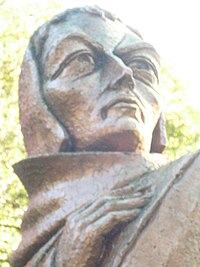John Duns
| John Duns Scotus | |
|---|---|

The Subtle Doctor
|
|
| Born |
c. 1266 Duns, County of Berwick, Kingdom of Scotland |
| Died | 8 November 1308 Cologne, Electorate of Cologne, Holy Roman Empire |
| Alma mater | University of Oxford |
| Era | Medieval philosophy |
| Region | Western philosophy |
| School |
Scholasticism Voluntarism Medieval realism (Scotistic realism) |
|
Main interests
|
Metaphysics, theology, logic, epistemology, ethics |
|
Notable ideas
|
Univocity of being, haecceity as a principle of individuation, Immaculate Conception of the Virgin Mary |
| Blessed John Duns Scotus, O.F.M. | |
|---|---|

A statue of John Duns Scotus by Frank Tritchler in the Public Park in the town of Duns erected in 1966
|
|
| Religious and priest | |
| Venerated in | Catholic Church |
| Beatified | 20 March 1993, Vatican City by Pope John Paul II |
| Major shrine | Franciscan Church, Cologne, Germany |
| Feast | 8 November |
John Duns, commonly called Duns Scotus (/ˈdʌnz ˈskoʊtəs, ˈskɒtəs/; c. 1266 – 8 November 1308), is generally considered to be one of the three most important philosopher-theologians of the High Middle Ages (together with Thomas Aquinas and William of Ockham). Scotus has had considerable influence on both Catholic and secular thought. The doctrines for which he is best known are the "univocity of being," that existence is the most abstract concept we have, applicable to everything that exists; the formal distinction, a way of distinguishing between different aspects of the same thing; and the idea of haecceity, the property supposed to be in each individual thing that makes it an individual. Scotus also developed a complex argument for the existence of God, and argued for the Immaculate Conception of Mary.
Duns Scotus was given the scholastic accolade Doctor Subtilis (Subtle Doctor) for his penetrating and subtle manner of thought. He was beatified by Pope John Paul II in 1993.
...
Wikipedia
